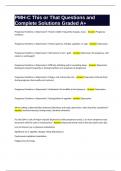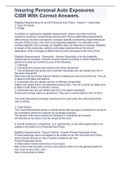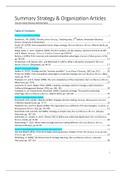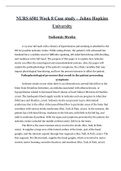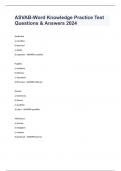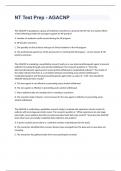Complete Solutions Graded A+
Pregnancy Emotions or Depression?: Mood is labile/ frequently changes, teary. - Answer: Pregnancy
emotions
Pregnancy Emotions or Depression?: Mood is gloomy, irritable, agitation, or rage - Answer: Depression
Pregnancy Emotions or Depression?: Self-esteem is low + guilt. - Answer: Depression (In pregnancy, self-
esteem is unchanged)
Pregnancy Emotions or Depression?: Difficulty initiating and/or sustaining sleep. - Answer: Depression
(Having to urinate frequently or having heartburn are symptoms of pregnancy)
Pregnancy Emotions or Depression?: Fatigue, not restored by rest. - Answer: Depression (May be tired
during pregnancy but usually rest restores.)
Pregnancy Emotions or Depression?: Anhedonia/ the inability to feel pleasure. - Answer: Depression
Pregnancy Emotions or Depression?: Dysregulation of appetite - Answer: Depression
When making a determination between baby blues and major depression, what should be considered? -
Answer: severity/intensity, timing/onset, duration/chronicity
For the DSM-5 code of Major Unipolar Depression (with peripartum onset), 5 or more symptoms must
be present with the same 2-week period: - Answer: Depressed mood most of the day nearly every day.
Loss of interest, joy or pleasure (anhedonia).
Significant wt or appetite changes. Sleep disturbances.
Psychomotor agitation/retardation.
Fatigue/loss of energy.
,Poor concentration/focus/indecisiveness.
Feelings of worthlessness.
Excessive/inappropriate guilt.
Recurrent thoughts of death/suicidal thoughts.
Signs of Generalized Anxiety Disorder - Answer: Excessive anxiety/worry.
Difficulty controlling one's worry.
Agitation/Irritability.
Restlessness + poor concentration.
Easily fatigues/sleep disturbances.
Increased somatic symptoms.
Panic Disorder symptoms? - Answer: Episodes of intense fear or discomfort peaks within minutes.
SOB, chest pain, dizziness, choking feeling.
Hot/Cold flashes.
Restlessness, rapid heartbeat, numbness/tingling sensations.
Excessive worry/fear.
Feeling as though "going crazy", losing control, or having a future attack.
Often no identifiable trigger.
Perinatal OCD or Perinatal Psychosis?: Parent recognizes thoughts/images are unhealthy. - Answer:
Perinatal OCD
Perinatal OCD or Perinatal Psychosis?: Parent has extreme anxiety related to thoughts/images. - Answer:
Perinatal OCD
Perinatal OCD or Perinatal Psychosis?: Parent is overly concerned about "becoming crazy" or "snapping".
- Answer: Perinatal OCD.
, Perinatal OCD or Perinatal Psychosis?: Parent does not recognize actions/thoughts are unhealthy. -
Answer: Perinatal Psychosis
Perinatal OCD or Perinatal Psychosis?: Parent may seem to have less anxiety when indulging in
thoughts/behaviors. - Answer: Perinatal Psychosis
Perinatal OCD or Perinatal Psychosis?: Parent has no insight about distortion of thoughts. - Answer:
Perinatal Psychosis
Perinatal OCD or Perinatal Psychosis?: The parent does not want to harm the baby. The thoughts are
obsessive in nature and frighten the parent. - Answer: Perinatal OCD
Perinatal OCD or Perinatal Psychosis?: The parent takes steps to protect the baby. - Answer: Perinatal
OCD
Perinatal OCD or Perinatal Psychosis?: Parent has NO delusions or hallucinations related to harming the
baby. - Answer: Perinatal OCD
Perinatal OCD or Perinatal Psychosis?: Parent has delusions about the baby (eg. baby is a demon) -
Answer: Perinatal Psychosis
Perinatal OCD or Perinatal Psychosis?: Thoughts of harming baby are ego-syntonic. - Answer: Perinatal
Psychosis. The parent thinks the thoughts are reasonable and/or feels tempted to act on them.
50% of women with bipolar disorder are first diagnosed when? - Answer: the postpartum period. The
DSM-5 now recognized that there can be peripartum onset of bipolar disorder.
Women who stopped mood stabilizers during pregnancy had ____ the risk of re-occurrence. - Answer:
2x and 4x more rapidly than women on medication. Most reoccurrences were depressive or mixed
(often in 1st trimester)
Bipolar II disorder is often referred to as the ______. - Answer: PPD imposter as it present with
depressive symptoms and can be resistant to SSRI medication.

